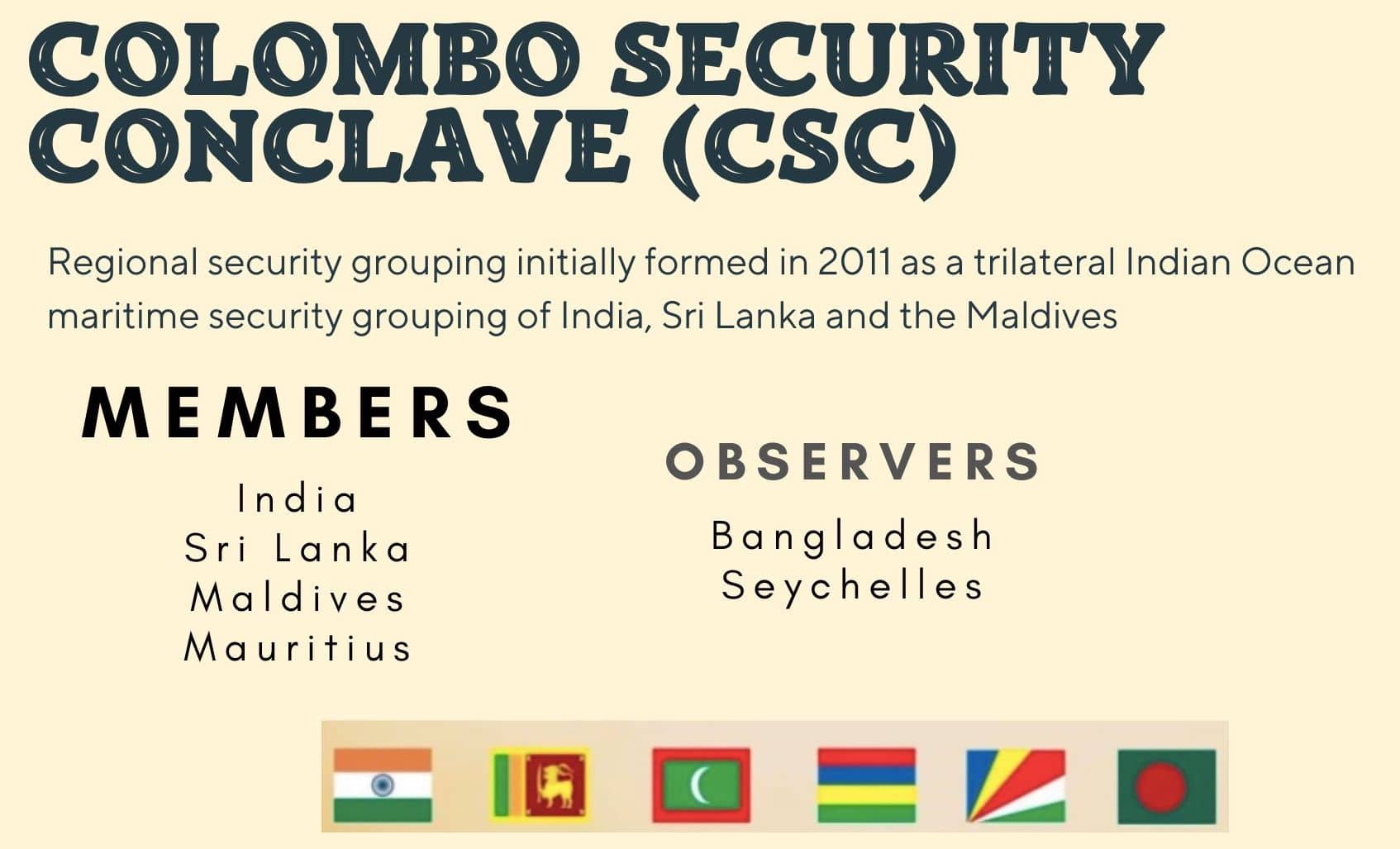
Disclaimer: Copyright infringement not intended.
Context
The emergence of the Colombo Security Conclave (CSC) represents a significant development in the Indian Ocean region, focusing on enhancing security cooperation among its member nations.
Details
- Formed through trilateral meetings involving India, Maldives, and Sri Lanka in 2011, the CSC aims to address critical security challenges and promote cooperation in the Indian Ocean.
- The recent NSA meeting in December 2023, presided over by India’s National Security Adviser Ajit Doval, reflects the CSC’s commitment to fostering a secure and stable Indian Ocean region.
- This meeting, attended by Mauritius, Sri Lanka, Bangladesh, and Seychelles as observers, highlighted the CSC's proactive approach to regional challenges, despite the absence of the Maldives due to domestic political changes.
Evolution and Expansion
- Initially initiated as trilateral meetings, the CSC faced a temporary suspension between 2014 and 2020 due to strained relations between India and the Maldives.
- However, it was re-established and rebranded in 2020, expanding to include Mauritius as a member, with Bangladesh and Seychelles participating as observers, potentially joining as full members.
Objectives and Pillars
- The CSC operates at the National Security Advisor (NSA) level, focusing on key areas such as maritime security, countering terrorism, cybersecurity, and addressing transnational crimes.
- Its agenda encompasses five significant pillars, including:
-
- Maritime safety and security.
- Countering terrorism and radicalization.
- Combating trafficking and transnational organized crime.
- Cybersecurity and protection of critical infrastructure and technology.
- Humanitarian assistance and disaster relief.

Operationalization and Exercises
- The CSC operationalizes its objectives through regular security-focused exercises.
- These exercises cover a broad range of areas including maritime search and rescue, cybersecurity, coastal security, and anti-terrorism measures.
- Notably, joint exercises involving India, Sri Lanka, and Maldives were conducted under the CSC's framework, showcasing collaborative efforts in enhancing security.
Ajit Doval's Perspectives and Institutionalization
- Indian NSA Ajit Doval, during the March 2022 meeting, emphasized the need for a 'concrete roadmap' and a 'defined charter of objectives' to formalize cooperation.
- He advocated for focused efforts on addressing drug trafficking and transnational organized crime.
- Moreover, the CSC seeks to establish a structured framework by proposing the involvement of coast guard heads and the formation of joint working groups to address specific challenges.
Changing Dynamics and India's Strategic Vision
- The CSC's trajectory underscores the evolving dynamics of the Indian Ocean.
- India's initiative to expand the CSC to include Mauritius, Seychelles, and Bangladesh signifies its evolving strategic vision in the region.
- As a traditional regional power, India views the CSC as an opportunity to strengthen its leadership and contribute significantly to the region’s security architecture.
Navigating the China Factor:
- China's growing presence in the Indian Ocean, evident through initiatives like the Belt and Road Initiative (BRI) and maritime infrastructure projects, has contributed to the CSC's resurgence.
- Beijing's investments, naval capabilities, and strategic interests in the region are perceived by India as an attempt to curb its influence and secure critical sea lines.
- Despite concerns, India acknowledges that several regional nations don't view China as a direct threat, leading the CSC to focus on multiple pillars of cooperation to address shared challenges like maritime security, counterterrorism, cyber threats, and humanitarian aid.
Operationalizing the CSC's Agenda:
- The CSC has made tangible progress in enhancing regional security by investigating terror financing, addressing narcotics trafficking, combating cybercrime, and promoting maritime safety.
- The institution has organized conferences on coastal security and engaged in collaborations on counter-terrorism, law enforcement, and cybersecurity.
- However, the CSC remains susceptible to domestic political shifts within member nations, as evident from the Maldives' absence, indicating the complex interplay of national interests, nationalism, and international alignments within these democracies.
Challenges and the Way Forward
- The CSC faces challenges concerning its expansion and coordination with existing multilateral groups in the Indian Ocean.
- It also aims to insulate itself from domestic political changes, highlighting the need for better institutionalization within participant countries.
- Additionally, to ensure a more concentrated focus on maritime concerns within the CSC, India might consider establishing bilateral maritime security dialogues with each CSC member country.

Conclusion
In conclusion, the CSC stands as a pivotal forum promoting enhanced security cooperation in the Indian Ocean region. While it has made strides in addressing diverse security challenges, overcoming challenges related to its structure and coordination with other regional bodies will be crucial for its sustained effectiveness and success.
|
PRACTICE QUESTION
Q. Examine the role and significance of the Colombo Security Conclave (CSC) in shaping regional security dynamics in the Indian Ocean. (250 Words)
|




